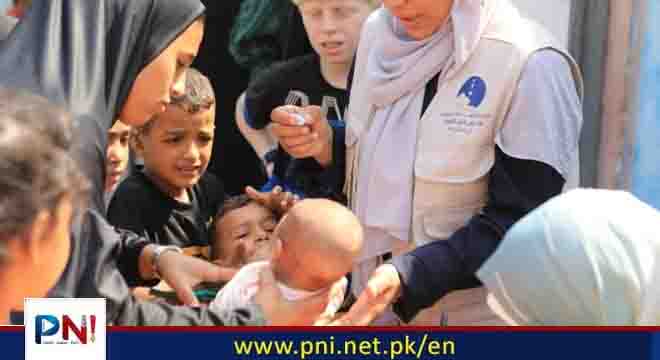UNITED NATIONS, Feb 07 : More than 12,000 critically ill and injured patients, including at least 5,000 children, urgently need to be evacuated from Gaza, amid the crumbling health system, the UN World Health Organization (WHO)’s top official in the region said Thursday.
Speaking from Gaza, WHO Representative Rik Peeperkorn described a scene of widespread destruction, overwhelmed medical facilities and growing mental health needs, as the population in the enclave gradually returns to what is left of their homes after nearly 16 months of conflict.
“Everyone in Gaza is affected…stress, anxiety, depression, and loneliness. It’s everywhere,” he said, highlighting the psychological toll on both residents and health workers.
Before the war, Gaza had more than 3,500 hospital beds. Today, only 1,900 remain, and very few intensive care units (ICUs) and incubators for newborns, leaving medical staff struggling to treat critical cases.
Even before the war, mental health services were limited, with just one psychiatric hospital, six community centres, and an NGO network providing support. Now, those facilities are either destroyed or non-functional.
The situation is particularly concerning in northern Gaza, where only two psychiatrists remain. In addition, only one hospital remains partly functional in the region, and the remaining either destroyed or severely damaged.
“Jabalya is like a wasteland. The destruction…is beyond belief,” he added.
Dr. Peeperkorn further stated that medical evacuations of critically ill and injured patients have begun, with 35 to 40 patients transferred daily.
“It is incredibly important that we expedite this and speed this up,” he said, emphasizing that, according to WHO estimates, between 12,000 to 14,000 patients need to be evacuated from Gaza, including at least 5,000 children.
Among the total estimated patients, about half suffer from trauma-related injuries while others need urgent treatment for chronic conditions such as cancer and cardiovascular disease.
Dr. Peeperkorn called for the urgent re-opening of additional medical corridors, especially the “traditional referral pathway” of the West Bank and East Jerusalem, where facilities are ready to receive patients.
Critical infrastructure, including electricity networks, has suffered extensive damage across the Gaza Strip.
Beyond the dire health crisis, the broader humanitarian situation in Gaza remains critical, with severe shortages of clean water, food, and essential services.
UN Emergency Relief Coordinator Tom Fletcher visited the enclave on Thursday, as UN agencies and partners continue responding to immense needs, a UN spokesperson said.
“In northern Gaza, Fletcher toured two hospitals – Al Shifa in Gaza City and Al Awda in Jabalya – where he met with patients, staff and management,” Farhan Haq, Deputy UN Spokesperson, told reporters at a news briefing in New York.
“Leaving the Al Awda hospital, he spoke with survivors and returnees in Jabalya who are trying to rebuild their lives amid the rubble.”
Farhan Haq further reported that water shortages remain particularly acute. The only operational water well in north Gaza, run by the UN Relief and Works Agency (UNRWA), serves as a crucial lifeline for clean drinking water.
However, widespread infrastructure destruction has left many residents without reliable access. Humanitarian partners are distributing 2,500 cubic metres of safe drinking water daily, reaching about 411,000 people, but this remains far below the actual needs.
A partner organization is also providing cleaning and sanitation services at 17 displacement sites in northern Gaza, benefiting nearly 12,000 displaced individuals.
“Water, sanitation and hygiene partners are carrying out assessments in locations across the Strip to repair water wells, install dosing pumps, and set up water filling points,” Farhan Haq said, adding: “while some repairs are already underway, further progress hinges on teams being able to clear debris and carry out
Meanwhile in the West Bank, Israeli military operations have intensified in Jenin, Tulkarm, and Tubas, severely restricting Palestinian access to essential aid, including water, food, medicine and supplies for infants.
In Tubas governorate, Israeli forces have been operating in the El Far’a refugee camp for five consecutive days, Mr. Haq reported.
“They have imposed a curfew, reportedly prohibiting residents from leaving their homes. They also bulldozed roads and damaged water networks, forcing residents to rely on collecting rainwater.”
Follow the PNI Facebook page for the latest news and updates.









